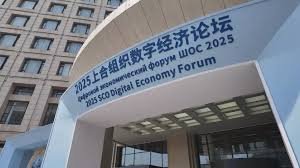Tianjin (China): As the 2025 Shanghai Cooperation Organization (SCO) Digital Economy Forum concluded in Tianjin on Friday, attention turned not only to regional cooperation but also to the host city itself, fast gaining recognition as one of China’s most dynamic digital economy zones.
Tianjin, a municipality of over 13 million people located in northern China, showcased its growing influence in the national and regional digital landscape by hosting the SCO’s flagship forum themed “New Bonds in the Digital Economy, New Horizons for Cooperation.”
The event, which brought together over 1,500 participants from across SCO member states, highlighted the city’s emergence as a strategic hub for innovation, investment, and cross-border digital collaboration.
According to official data, Tianjin’s core digital economy industries recorded a 12.2 percent year-on-year revenue growth in the first quarter of 2025, with the sector contributing 9.4 percent of the city’s total GDP.
This steady expansion reflects not only robust local development but also Tianjin’s ability to integrate national-level digital strategies with practical urban implementation.
Speaking on the sidelines of the forum, local officials from the Tianjin municipal government emphasized the city’s investment in new infrastructure, including computing power centers, data exchange nodes, smart city platforms, and low-altitude economy corridors designed to support drone-based logistics and mobility solutions.
“Tianjin is not just a backdrop for digital policy dialogue—it is a live laboratory,” a senior city official told media representatives. “We are piloting projects that can scale up nationally and connect across borders through the SCO framework.”
Tianjin’s role as a digital testbed was visible during the interactive exhibitions held throughout the SCO forum.
Delegates and business leaders explored working models of artificial intelligence applications, robotics platforms, urban digital twins, and IoT-based smart grids developed by state-owned enterprises headquartered in the city.
The city’s strategic location as a coastal transport hub also contributes to its appeal for digital economy initiatives. Its proximity to Beijing and integration into the Beijing-Tianjin-Hebei economic corridor enables it to serve as a gateway for technology-intensive industries seeking access to capital, research institutions, and export infrastructure.
Over the past few years, Tianjin has been rolling out urban digital pilot zones, where emerging technologies such as 5G, autonomous transport, big data analytics, and smart governance systems are being deployed in real-time.
These zones have attracted both domestic firms and international investors looking to validate new products and services under regulatory frameworks that allow controlled experimentation.
During the forum, the city also hosted the State-Owned Enterprises (SOEs) Digital Technology Application Promotional Event, where local giants showcased their contributions to smart manufacturing, cloud computing, and urban infrastructure.
The event not only demonstrated industrial capacity but also facilitated matchmaking with international partners and SCO delegates, linking Tianjin’s industrial base with broader regional development goals.
Municipal authorities pointed to their alignment with China’s broader push for a “Digital China”, a policy direction led by the central government aiming to modernize governance, boost economic productivity, and foster international digital partnerships.
By serving as the host of this year’s SCO digital forum, Tianjin reinforced its position as a model city for implementing those national goals in an international context.
The forum’s outcomes—including the signing of 21 cooperation agreements worth 1.35 billion yuan and the release of model cases for SCO digital economy collaboration—are expected to further deepen Tianjin’s role in facilitating cross-border innovation.
Several of the projects announced are either based in Tianjin or involve Tianjin-based enterprises as lead implementers.
Observers noted that the city’s transformation offers important lessons for other developing urban centers in the SCO region seeking to build their digital infrastructure.
Its ability to combine policy support, industrial integration, and global outreach has positioned it as a template for urban digitalization under multilateral cooperation models.
For now, Tianjin stands not only as the physical host of the SCO Digital Economy Forum, but as a symbol of what a modern, forward-looking digital city can achieve, blending growth, governance, and global cooperation in a new era of connectivity.
The Diplomatic Insight is a digital and print magazine focusing on diplomacy, defense, and development publishing since 2009.



